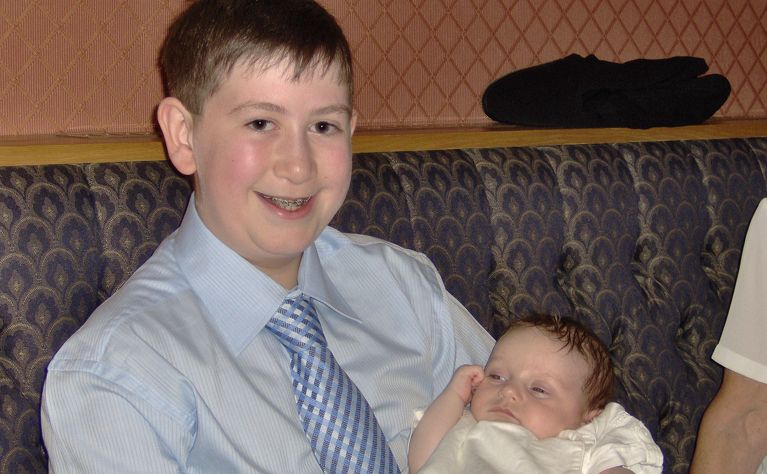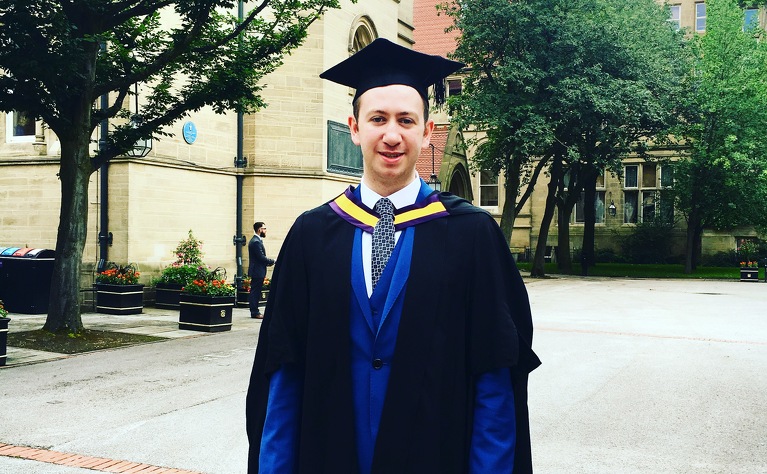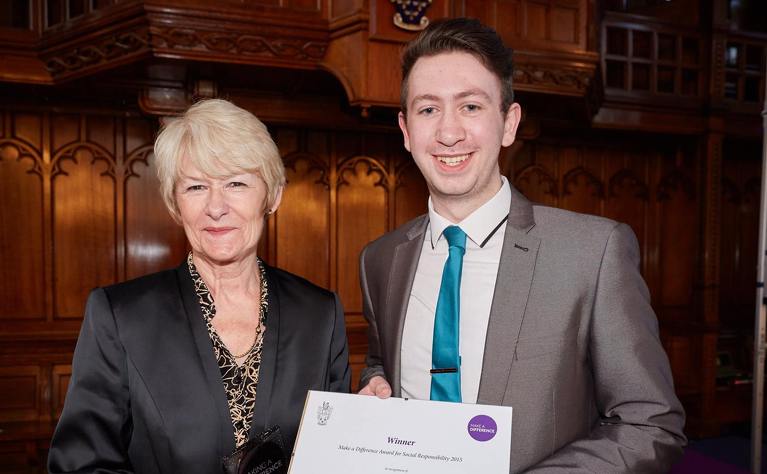Name: Simon Stones
Year of Birth 1993
Lives: Manchester, UK
Type of IBD: Crohn’s disease, (plus IBS, juvenile idiopathic arthritis, psoriatic arthritis, fibromyalgia)
Diagnosis Date: April 2008
Symptoms at Diagnosis: Abdominal pain, diarrhoea
Living with inflammatory bowel disease (IBD) is a rollercoaster of a journey, right from those early days when you have no idea what is going on, through to accepting and adjusting to life with IBD, and moving on to achieve your dreams and aspirations. My journey started at the age of 12, when I began to suffer with abdominal pains and the usual ‘toilet problems’!
Unfortunately, it took over two years for me to be diagnosed with Crohn’s disease ‐ even the gastroenterologist was completely shocked to find this. I was not your typical patient ‐ I had not lost weight, there were no vast changes of inflammation in my blood (such as the C-reactive protein [CRP] test that is often used), and I had no family history of IBD.

However, I have suffered with juvenile arthritis and fibromyalgia from the age of three, and so my blood inflammation was already sky high, and the arthritis was mostly treated with steroids, so I already had the moon face, and weight gain associated with the medication. I remember fighting, and fighting for answers, being told it was ‘just constipation’.
When the camera investigations were done, I vividly remember the consultant coming into the room, sitting on the bed, and saying the exact words, "I am so, so, sorry Simon. I never realised how bad you really were". The entire gastrointestinal tract was affected, and ulcerated, from the esophagus right through to the other end! Treatment began the same day, with Mesalazine and Omeprazole, and I was delighted to find out that I would be on a ‘no food’ diet for eight weeks! Say hello to the polymeric diet ‐ now that’s an experience that I’d rather not try again, and I think it put me off milk for life!
Symptoms started
I was aged 12
Diagnosed with Crohn's disease
Aged 14. Placed on liquid diet
Given home schooling for 3 months
Gained 3 A levels
Two years previously I got 16 GCSEs
Started at University of Manchester
Studying biomedical sciences
Graduated from university with a 1st
I remember the first night I spent in hospital after being diagnosed ‐ I was sat in a side ward cubicle, alone, in the dark, and I remember sitting in bed, crying and asking ‘why me’ ‐ why am I so unlucky to not only have to deal with the challenges that arthritis had presented in the previous 11 years, but also the thought of living with Crohn’s disease? I was petrified I would need a colostomy bag; it was one of the thoughts that I could just not get out of my head, I’d never met another person with Crohn’s, or in fact heard of it before hand. I felt completely isolated.
Over the coming weeks, I began to adjust to Crohn’s ‐ I wasn’t actually any different now than I had been over the last year. The only difference now was that I knew what was wrong with me. It wasn’t ‘all in my head’, as a few people had suggested over the previous two years. As I was diagnosed in April, my SAT tests in year 9 were looming, and so I tried going into school shortly after diagnosis, to see if I was strong enough.
I found it challenging ‐ emotionally and physically. Sitting with people eating and drinking normally was just a torment in itself, but trying to do everything my friends were doing was just too much, and so the school arranged from home tutoring, via the local authority, for a period of three months. These weeks out of the school environment allowed me to build up my energy, readjust to eating normally after the polymeric diet, and build up confidence again to face the world.
My next worry, and challenge, was coping with Crohn’s disease whilst studying for my GCSEs and A-Levels. I had noticed that my symptoms worsened when I was stressed, and this made me even more anxious just thinking about getting stressed ‐ it really is a vicious cycle. At times, I questioned whether it was worth putting myself under all of this pressure, to achieve the grades I wanted. I was never happy with anything below a B, which didn’t help the situation! In hindsight, I’m so glad that I stuck with it all, gaining 16 GCSEs and 3 A-Levels, before starting my undergraduate degree at The University of Manchester in Biomedical Sciences in 2012.


There have been challenges and days when I wished that I didn’t have Crohn’s, but you certainly come through the other end, feeling stronger and even more motivated to achieve your goals. Who knows what the future will bring, but I live for today and dream for tomorrow ‐ it’s the best way to be.